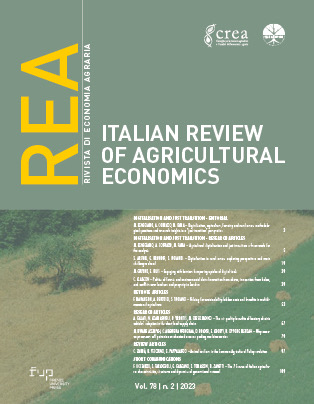Published 2023-12-31
Keywords
- digital tools,
- barriers,
- rural development,
- beef sector
How to Cite
Copyright (c) 2023 Mikelis Grivins, Emils Kilis

This work is licensed under a Creative Commons Attribution 4.0 International License.
Funding data
-
Horizon 2020 Framework Programme
Grant numbers 818194
Abstract
It is widely accepted that digitalisation can allow us to tackle the social, economic and even environmental challenges that agro-food systems are currently facing. There is a vibrant debate regarding the challenges one might face when adopting digital tools. This article engages in this discussion by exploring how barriers farmers encounter when implementing digital solutions manifest themselves as practical challenges farmers have to resolve. To do this, the article explores three cases in Latvia’s beef farming sector. The article focuses on the following two questions: 1) what were the challenges that the groups of farmers faced while trying to implement the new solutions; 2) how did these challenges transform the initial solutions the farmers were trying to implement? The three cases represent three initiatives at various stages of development (an emerging cooperative of beef farmers; an unorganised attempt by farmers to develop joint digital marketing tools; an online shop developed and maintained by an individual enterprise). The article argues that there are multiple creative strategies for dealing with barriers to digitalisation, but studies focusing on different obstacles to digitalisation should also be mindful of pre-existing issues that hamper digitalisation, while simultaneously being impervious to purely digital fixes.
Downloads
References
- Adão R., Beraja M., Pandalai-Nayar N. (2022). Fast and Slow Technological Transitions.
- Barrett C.B., Benton T.G., Cooper K.A., Fanzo J., Gandhi R., Herrero M., James S., Kahn M., Mason-D’Croz D., Mathys A., Nelson R.J., Shen J., Thornton P., Bageant E., Fan S., Mude A.G., Sibanda L.M., Wood S. (2020). Bundling innovations to transform agri-food systems. Nature Sustainability, 3: 974-976. DOI: https://doi.org/10.1038/s41893-020-00661-8
- Bronson K. (2019). Looking through a responsible innovation lens at uneven engagements with digital farming. NJAS - Wageningen Journal of Life Sciences, 90-91, 100294. DOI: https://doi.org/10.1016/j.njas.2019.03.001
- Central Statistical Bureau of Latvia. (2019). Internet usage at households continues to increase [Press release].
- DESI (2022). Digital economy and society index (DESI) 2022. Latvia.
- Dufva T., Dufva M. (2019). Grasping the future of the digital society. Futures, 107: 17-28. DOI: https://doi.org/10.1016/j.futures.2018.11.001
- European Commission (2018a). EU funds broadband access for underserved households in rural Latvia.
- European Comission (2018b). Shaping the digital (r)evolution in agriculture.
- Ferrari A., Bacco M., Gaber K., Jedlitschk A., Hess S., Keipainen J., Koltsida P., Toli E., Brunori G. (2022). Drivers, barriers and impacts of digitalisation in rural areas from the viewpoint of experts. Information and Software Technology. 145, 106816. DOI: https://doi.org/10.1016/j.infsof.2021.106816
- Fielke S., Taylor B., Jakku E. (2020). Digitalisation of agricultural knowledge and advice networks: A state-of-the-art review. Agricultural Systems. 180, 102763. DOI: https://doi.org/10.1016/j.agsy.2019.102763
- Klerkx L., Rose D. (2020). Dealing with the game-changing technologies of Agriculture 4.0: How do we manage diversity and responsibility in food system transition pathways? Global Food Security. 24, 100347. DOI: https://doi.org/10.1016/j.gfs.2019.100347
- Kobos P.H., Malczynski L.A., Walker L.T.N., Borns D.J., Klis G.T. (2018). Timing is everything: A technology transition framework for regulatory and market readiness levels. Technological Forecasting & Social Change. 137: 211-225. DOI: https://doi.org/10.1016/j.techfore.2018.07.052
- OECD (2021). Going Digital in Latvia. DOI: https://doi.org/10.1787/8eec1828-en.
- Rijswijk K., de Vries J.R., Klerkx L., Turner J.A. (2023). The enabling and constraining connections between trust and digitalisation in incumbent value chains. Technological Forecasting & Social Change, 286. DOI: https://doi.org/10.1016/j.techfore.2022.122175.
- Schneider S., Kokshagina O. (2018). Digital transformation: What we have learned (thus far) and what is next. Creat Innov Manag, 30: 384-411. DOI: https://doi.org/10.1111/caim.12414
- VARAM (2020). Digitālās transformācijas pamatnostādnes 2021-2027. Gadam (Digital Transformation Guidelines for 2021-2027).
- Zhao G., Liu S., Lopez C., Lu H., Elgueta S., Chen H., Boshkoska B.M. (2019). Blockchain technology in agri-food value chain management: A synthesis of applications, challenges and future research directions. Computers and Industry. 109: 83-99. DOI: https://doi.org/10.1016/j.compind.2019.04.002


